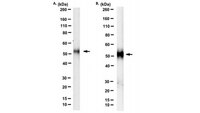MABT1438-100UL Sigma-AldrichAnti-HYAL1 Antibody, clone 1D10
Anti-HYAL1, clone 1D10, Cat. No. MABT1438, is a mouse monoclonal antibody that detects Hyaluronidase-1 and is tested for use in Immunohistochemistry, Western Blotting, and Western Blotting using knockout lysate.
More>> Anti-HYAL1, clone 1D10, Cat. No. MABT1438, is a mouse monoclonal antibody that detects Hyaluronidase-1 and is tested for use in Immunohistochemistry, Western Blotting, and Western Blotting using knockout lysate. Less<<Prodotti consigliati
Panoramica
| Replacement Information |
|---|
| References |
|---|
| Product Information | |
|---|---|
| Format | Purified |
| Presentation | Purified mouse monoclonal antibody IgG1 in buffer containing 0.1 M Tris-Glycine (pH 7.4), 150 mM NaCl with 0.05% sodium azide. |
| Quality Level | MQ200 |
| Physicochemical Information |
|---|
| Dimensions |
|---|
| Materials Information |
|---|
| Toxicological Information |
|---|
| Safety Information according to GHS |
|---|
| Safety Information |
|---|
| Storage and Shipping Information | |
|---|---|
| Storage Conditions | Recommend storage at +2°C to +8°C. For long term storage antibodies can be kept at -20°C. Avoid repeated freeze-thaws. |
| Packaging Information | |
|---|---|
| Material Size | 100 µL |
| Transport Information |
|---|
| Supplemental Information |
|---|
| Specifications |
|---|
| Global Trade Item Number | |
|---|---|
| Numero di catalogo | GTIN |
| MABT1438-100UL | 04065266876161 |
Documentation
Anti-HYAL1 Antibody, clone 1D10 MSDS
| Titolo |
|---|
Anti-HYAL1 Antibody, clone 1D10 Certificati d'Analisi
| Titolo | Numero di lotto |
|---|---|
| Anti-HYAL1, clone 1D10 - Q3731373 | Q3731373 |








